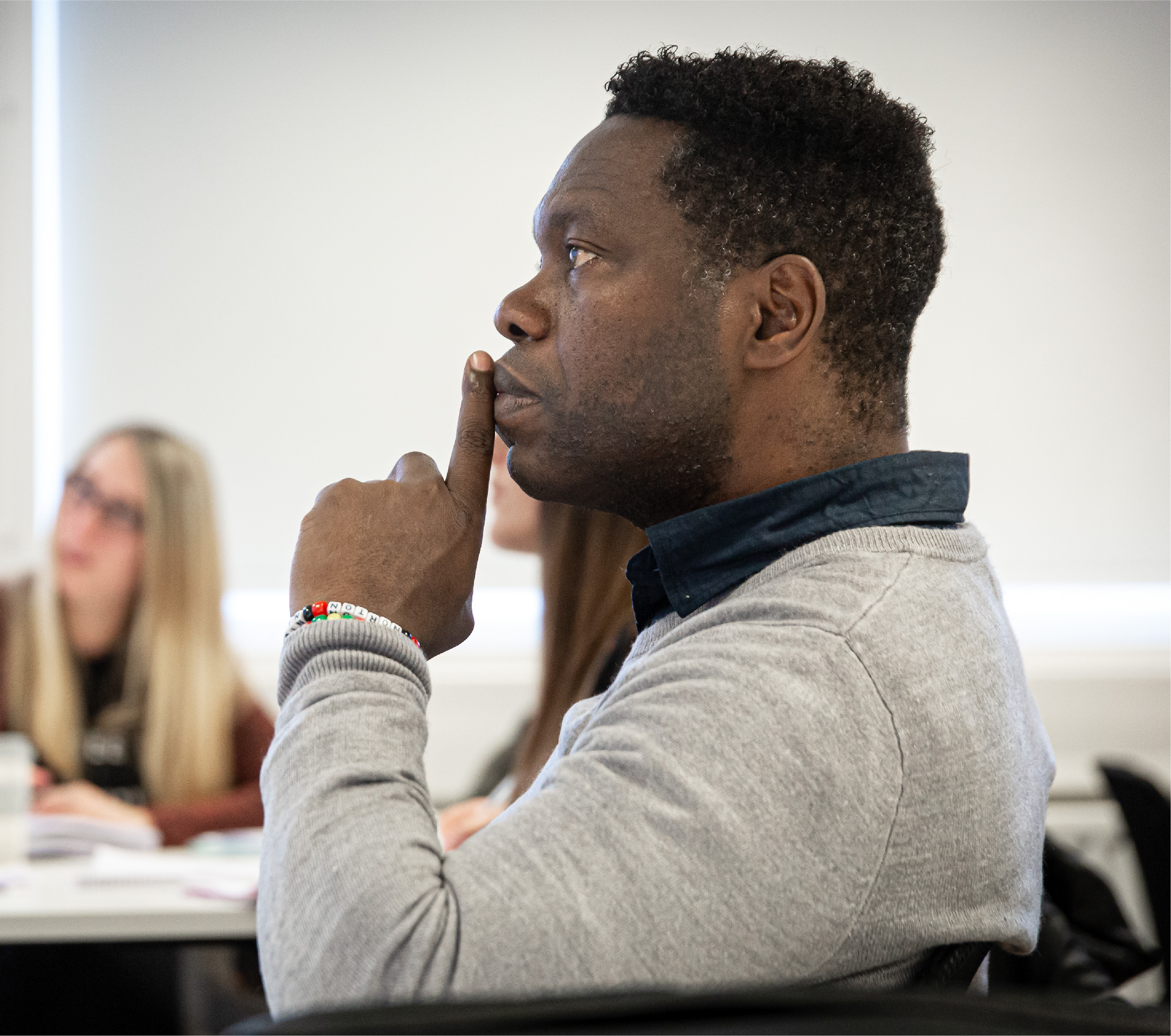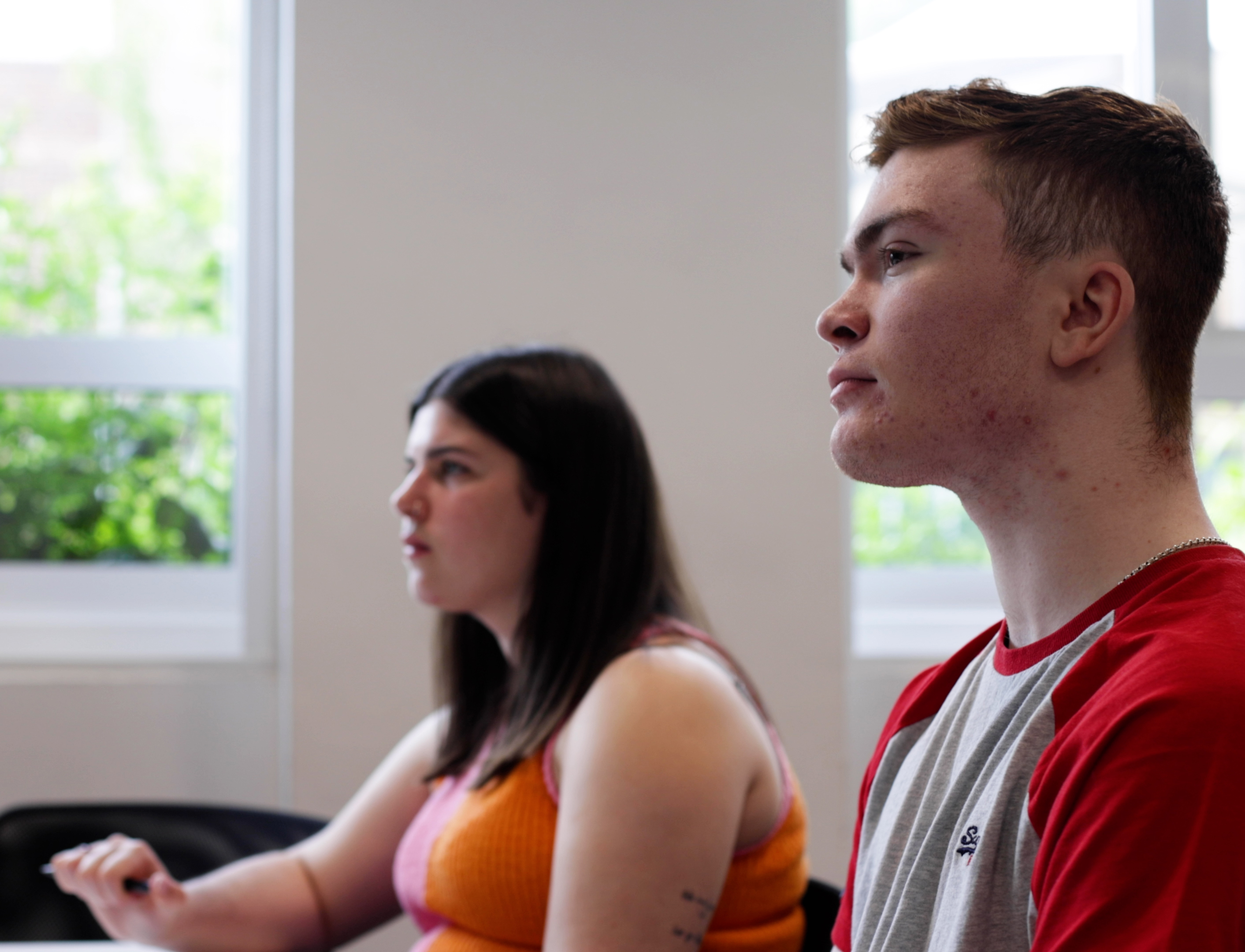You'll discover a broad range of psychological topics and be able to tailor your course around specific interests, enabling you to specialise in a particular area of psychology. Alongside learning various theories across your modules, you'll have the chance to practically develop your skills through mock scenarios and your time in placement.
The course is professionally accredited by the British Psychological Society (BPS) and, providing you achieve at least a 2:2 in your degree, you will be eligible for Graduate Membership of the BPS and the Graduate Basis for Chartered Membership (GBC), the first step to becoming a Chartered Psychologist.
BPS accreditation is both an important hallmark of quality that is extensively acknowledged by employers in the field, and an essential stepping-stone if you are looking to progress to become a Chartered Psychologist after graduation.
Taking a BPS accredited course is necessary if you wish to pursue a career in psychology or in the wider psychological workforce. For information on the benefits of studying an accredited course, visit the BPS website.
University of the Year finalist
Recognised for our graduate success, we’re shortlisted for University of the Year in the Times Higher Education Awards 2025.
Overview
Previously known as Forensic Psychology BSc, this course will develop your understanding of key psychological concepts while teaching you to apply them in a forensic and criminal justice context. You’ll learn why crimes happen, how victims and perpetrators can be affected, and how the risk of further offending can be reduced. You'll study topics like criminal behaviour, witness testimony and investigation techniques, and explore ways in which forensic psychologists assess and treat people who commit crimes.
Our course is professionally accredited by the British Psychological Society (BPS) and has a strong practical focus that will build your professional skills alongside your studies, helping you stand out to future employers. During your studies, you'll be eligible for student membership of the BPS – this will allow you to connect with other Psychology students through networks, online communities and in-person events.
You'll apply psychological theory to the criminal justice system, and will learn to interpret, evaluate and explain information relating to investigation, risk, rehabilitation and criminal behaviour.
If you want to specialise on a particular field within Psychology, you'll have the opportunity to follow one of our Psychology pathways: Psychology with Mental Health Practice BSc (Hons), Psychology with Sport and Exercise Studies BSc (Hons) and Psychology with Criminal and Forensic Contexts BSc (Hons).
Placements
As part of the course, you will have the chance to see first hand what it's like to work as a mental health professional through your placement with a mental health charity, NHS, private health care, care home, or school of your choosing. You'll apply what you've learnt in lectures to practice, be able to speak to working professionals and learn from them, enabling you to gain a deeper awareness of the various roles and working environments within the profession and be able to reflex on your experience and apply that to your work and career aspirations.
You’ll be supported by our Careers and Employability team in arranging paid and voluntary placements with many local and national organisations. Recent placement opportunities have included the NHS, the British Psychological Society (BPS) and Mind, a mental health charity.
You can also choose to participate in psychological research or join our paid ‘students as researchers’ scheme, which will provide you with opportunities to work alongside staff on live projects.
Course content
Each year you will study a mix of mandatory and optional modules. This flexible course lets you explore different subjects and career paths in both criminology and forensic psychology before choosing to specialise in your final year.
We regularly review our courses to reflect the latest research and developments in the subject area, as well as feedback from students, employers and the wider sector. As a result, modules may change to ensure the course remains current and relevant.
Optional modules will run if enough students choose to study them. It is not guaranteed that all modules will be offered every year.
Careers
The transferable skills and psychological knowledge you will gain from this course will provide you with a foundation to either pursue further psychological or medical qualifications like Counselling (MSc), Business Psychology (MSc), Occupational Psychology (MSc), Mental Health and Wellbeing Practitioner in Specialist Adult Mental Health (PGCert/ Grad Cert), PGCE Secondary Psychology (Teacher Training) and Psychology MPhil/PhD.
The research, analytical and presentation skills you'll gain are in high demand in a range of careers, including:
- Practising psychologist
- Psychotherapist
- Counsellor
- Academic
- Social Worker
- Human Resources
- Probation officer
- Government and policy
- Police officer
- Prison officer
Specialisms
To practice as a psychologist, you'll need to complete an accredited postgraduate qualification in your chosen specialism, these include:
- Clinical psychology
- Counselling psychology
- Educational psychology
- Forensic psychology
- Occupational psychology
- Sport and exercise psychology
You can find out more about the different specialisms and postgraduate training from the British Psychological Society (BPS).
Case study
Course highlights
Teaching and assessment
Through a mix of taught classes, work-based learning and assessments, this course is designed to provide you with a platform for achieving Graduate Basis for Chartered Membership within psychology, and have the skills and experience needed to move into a wide-range of jobs.
Teaching and assessment contents
You'll learn through a mix of teaching styles, such as lectures, seminars, computer lab work and practical sessions so you can understand the theory by applying it in practice. Lectures are used to introduce you to core ideas, drawing from both classic theories and modern-day examples. You'll also have the chance to discuss theories and practices with your peers in seminars, and practical classes will provide you with key practitioner-based skills.
Meet the Team
Just a few staff members from the wider team of psychology lecturers.
Entry requirements
UCAS tariff points required: 112
| Qualification | Grade |
|---|---|
| A-level | BBC |
| BTEC National Extended Diploma | DMM |
| T-level | Merit |
We do accept Access to HE Diplomas and other qualifications which may not exactly match the combinations above. Work out your estimated points with the UCAS tariff calculator.
Any questions?
If you have any questions about entry requirements, please call our Admissions Office on 01905 855111 or email admissions@worc.ac.uk.
Fees
Fees contents
UK and EU students
In 2026/27 the standard fee for full-time home and EU undergraduate students on BA/BSc/LLB degrees and FdA/FdSc degrees is £9,790 per year.
Tuition fees are reviewed annually and may increase each year for both new and continuing students.
For more details on course fees, please visit our course fees page.
International students
In 2026/27 the standard tuition fee for full-time international students enrolling on BA/BSc/LLB degrees and FdA/FdSc degrees is £17,200 per year.
Tuition fees are reviewed annually and may increase each year for both new and continuing students.
For more details on course fees, please visit our course fees page.
How to apply
How to apply contents
Applying through UCAS
UCAS is the central organisation through which applications are processed for full-time undergraduate courses in the UK.
Read our how to apply pages for more information on the application process, or if you’d like to apply for part-time study.
- Psychology with Criminal and Forensic Contexts BSC (Hons) - CL83
- Psychology with Mental Health Practice BSC (Hons) - C848
- Psychology with Sport and Exercise Studies BSc (Hons) - C813
- Psychology BSc (Hons) - C800
Contact
If you have any questions, please get in touch. We're here to help you every step of the way.

Admissions Office
admissions@worc.ac.uk01905 855111More to explore
Open Days
Visiting us is the best way to get a feel for student life at the University of Worcester.

The City of Worcester
Worcester is a welcoming university city with great transport links and plenty of student parking.

Accommodation
Benefit from our accommodation guarantee. We have rooms on campus to suit every budget including en-suite options.










